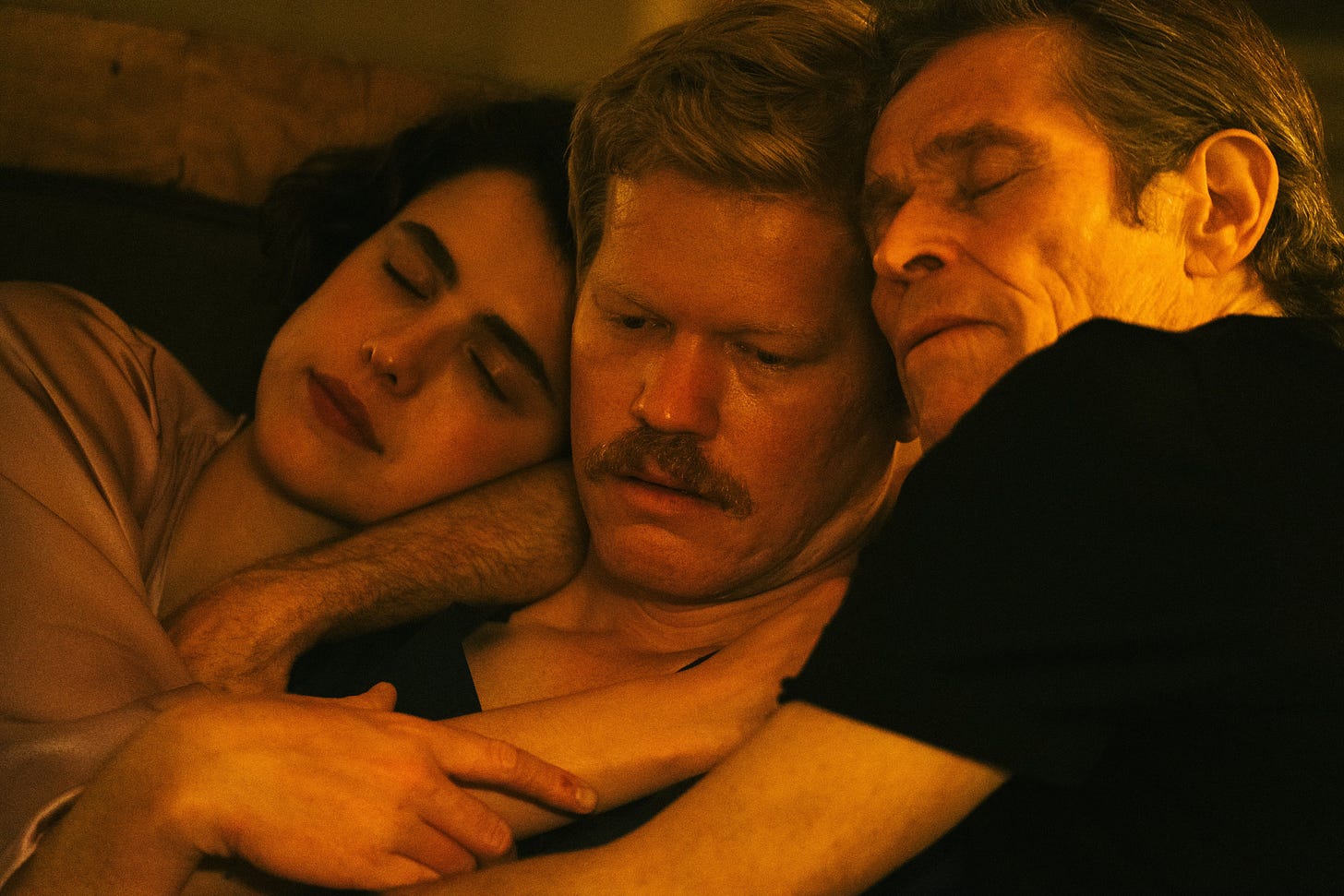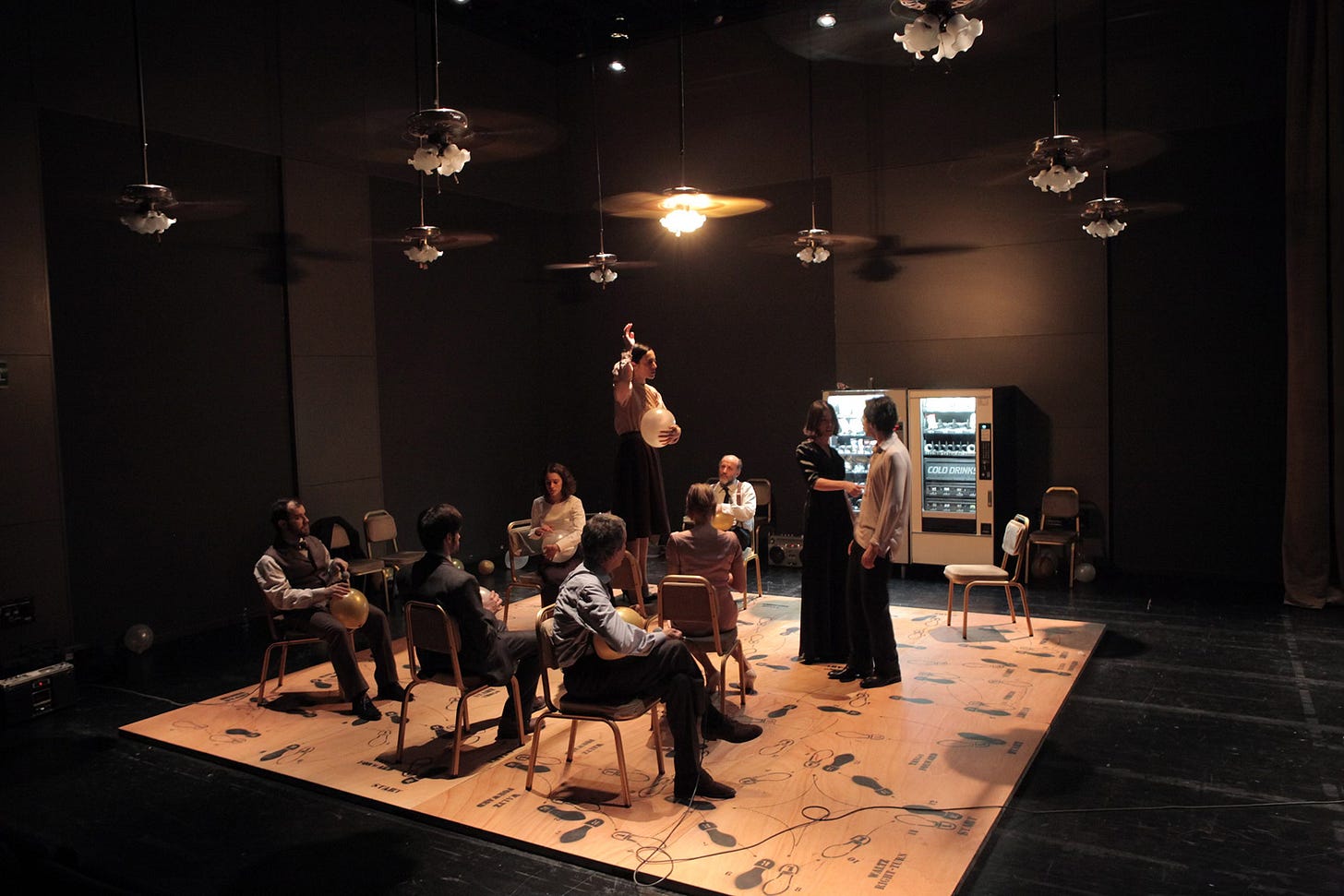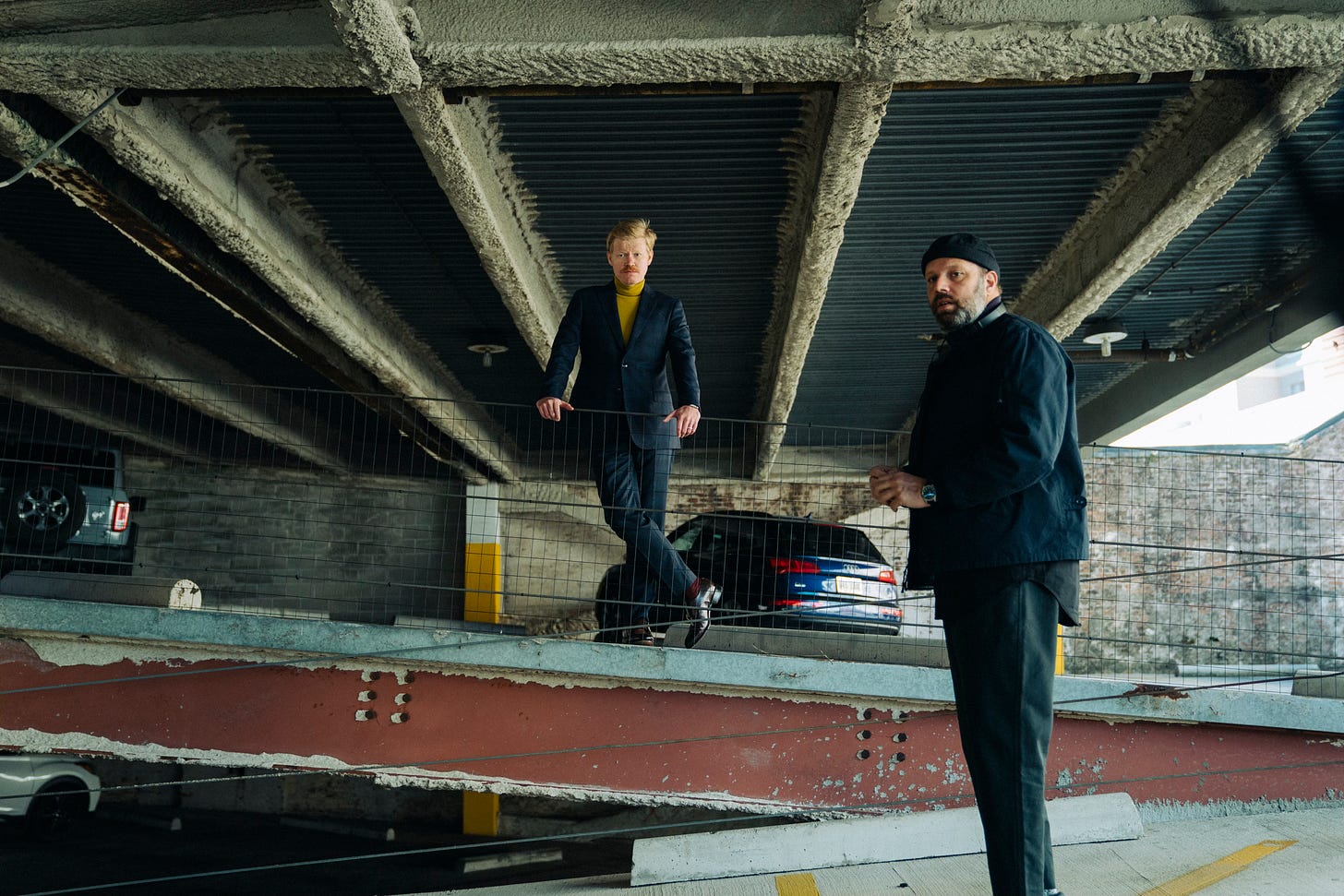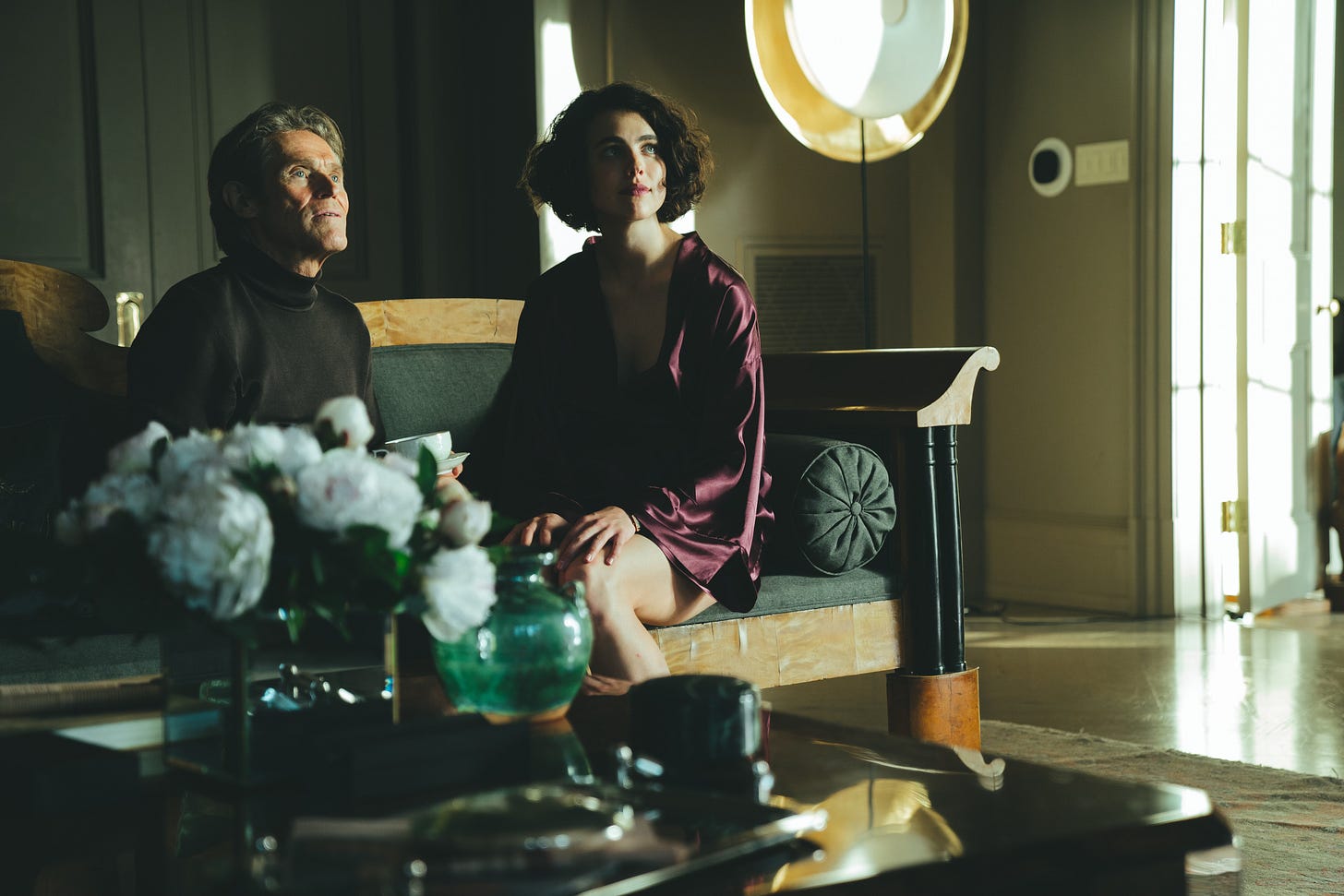“It was better when you said it standing up.”
The Death of R.M.F., dir. Yorgos Lanthimos 2024, 51 minutes.
Pictures: Fox Searchlight / National Theatre Greece. Video: cosmonayths (YouTube)
Kinds of Kindness, originally titled And., is undoubtedly one of the best – and most sophisticated – films of the year. It makes Poor Things look practically mainstream in its form and content. This is the first of three separate blogs, each covering one of the film’s three distinct segments. The first section of the film is called The Death of R.M.F.
See Margaret Qualley (unfathomably hot, as she is in all four of her roles here) proudly tapping on the piano as Willem Dafoe and Jesse Plemons lie entwined on the sofa. “I know your eyes in the morning sun … I feel you touch me in the pouring rain …” Her voice is high-pitched, just a touch staccato, faltering yet confident. That this isn’t the first time that Yorgos Lanthimos has used the Bee Gees’ How Deep Is Your Love in something he’s directed is neatly summative of the entirety of his newest, Kinds of Kindness, made concurrently with the postproduction of his masterpiece, the staggeringly inventive Poor Things. As you would expect from Lanthimos’ post-Lobster output, it takes mainstream Hollywood stars and places them in wildly bleak scenarios, where they don’t resemble characters – bound to the laws of boring words like ‘psychology’ and ‘motivation’ - but rather droll, autist marionettes, controlled by strings they can’t comprehend (or can’t bring themselves to), dangling over a big empty void. And even if its three-film structure ultimately results in diminishing returns, it’s only because this first section of Kinds of Kindness might be the best fifty-minutes I’ve spent in a cinema all year, largely because it acts as a brutal takedown of the very process by which cinema is made, and winkingly gestures towards the form in which Lanthimos first employed the classic song.
But back to How Deep Is Your Love. The stage for Lanthimos’ most recent offering to the theatre – the deadest of all art forms, at least in England – was a production of Anton Chekhov’s Platonov for the National Theatre of Greece in 2011. The set, by Anna Georgiadou, resembled a splicing of the kind of banqueting room you find in blandly horrible airport hotels all around the world, and a draughty high school gymnasium. On the back wall were two vending machines. In fact, it bore a striking resemblance to the gym that the sick troupe of Alps (2011) practice in, which is interesting as I believe Lanthimos went into rehearsals for Platonov immediately after wrapping Alps in late 2010. The lighting by Thimios Bakatakis was warm and soft - an electric rendering of the candlelight that lit Chekhov’s era.
For anyone fortunate enough to be unfamiliar with Platonov, thus being in the position where they get to read it for the first time, it is Chekhov’s first play and maybe his greatest, written in his early 20s. It follows a provincial schoolmaster, the titular Mikhail, a disillusioned and depressed Don Juan wannabee. When he arrives on the veranda of the sexy widow Anna Petrovna, he kicks off a game of sexual entanglement and petty scratching with a group of women that will have brutal consequences for all involved. Platonov is the perfect Lanthimos text because it depicts a dynamic that wouldn’t be out of place in one of his collaborations with Efthimis Filippou: a depressed, disillusioned nobody finds himself in a series of conflicts with other depressed, disillusioned nobodies and the stakes escalate until there is only one way out. Bang goes his gun.
(For what it’s worth, I really wish Lanthimos would return to the theatre, specifically in the UK so I can go and see it. On his website there’s brief info on his four works as director, all 2003-2011. As you’d expect, all look inventive and beautiful. There aren’t any good theatre directors besides Robert Icke alive today. Then again, why the fuck would someone of Lanthimos’ calibre want to take shit pay to work with simpering, pussy-lipped thesps in shithole London when he can just hang out with Emma Stone in California?)
The text for Lanthimos’ production was written by the Great Old Man of British theatre, David Hare, but you wouldn’t know it. Lanthimos kept the cast tight by having four of the nine-strong cast multirole, and none of the servants and helpers who usually bog down stagings are present. In fact, the trailer for the production features barely any spoken dialogue – it has more in common with the tanztheater of Pina Bausch or Dimitris Papaioannou. And because these actors are not dancers, they bring a ferocious honesty to their movements, which somehow makes their dancing all the more potent. The production began with a dark stage: a man walked to the centre of it holding a microphone to sing a familiar tune: “I know your eyes in the morning sun … I feel you touch me in the pouring rain...”
If this has felt like a long-winded introduction to Kinds of Kindness, then it’s only because its first story, The Death of R.M.F. feels distinctly Chekhovian in its premise – or at the very least reminiscent of Lanthimos’ remixing of Platonov. A man, Robert (Plemons), allows his life to be ruled by his boss Raymond (Dafoe) down to the minute: when he wakes up, what he has for breakfast, even when he has sex with his wife. One day, Raymond asks Robert to kill a man. Robert can’t bring himself to pull the trigger and is cut adrift by Raymond. Ultimately, Robert finds the strength to do what must be done and the gun is fired. But there is no gun here, because Lanthimos swaps it for a disgusting Ford Bronco which Raymond repeatedly drives over an unconscious body, and the drawing rooms and verandas of Chekhov’s Russia have been swapped for austere mansions, stifling office blocks and a soulless hotel bar. Kinds of Kindness also sees Lanthimos return to the geographic dislocation of The Killing of a Sacred Deer – the accents and buildings are all American but where, exactly, are we?
To answer that question, let’s lay out the facts. We’re in a space which looks like our world which isn’t. Most of the action takes place indoors, in a set of recurring interiors. Where people act just a little differently; more stilted, unnatural, rehearsed. And in which emotions are heighted to a hysterical degree but the dramatic action is nonetheless divided into neat little segments. In other words, we’re in a theatre and Raymond is, for all intents and purposes, a director.
The film opens with a tracking shot of Raymond’s wife Vivian (Qualley) moving through their mansion to greet R.M.F, who is handed an envelope full of cash. Interestingly, Lanthimos begins on Vivian’s feet. Feet are a recurrent note throughout the rest of Kinds of Kindness, though I’m still grappling with the exact significance what they signify. She’s on the phone to Raymond when she opens the door: “Yes, he just arrived. He is wearing beige pants, brown leather derby lace ups, a white shirt with what must be his initials on it.” While we don’t hear Raymond over the phone, we infer that he’s unhappy with Vivian’s description as she offers to take a picture of R.M.F. which she sends to Raymond. We can also speculate that Vivian doesn’t live her life according to a schedule from her husband, as she wonders aloud to him what she’ll do with the rest of her day after R.M.F. is dismissed. Raymond’s fixation on what R.M.F. is wearing suggests a need for control, to know simply for the sake of knowing, but also an awareness of aesthetic, of the construction of an image: in this case of R.M.F. tangled in the wreck of a car. Raymond is thinking about costume
This idea reaches its bizarre zenith later, when Robert goes to express his doubts to Raymond about killing R.M.F. Robert is clearly shitting his pants when he tells Raymond that while he’s given it a lot of thought, he can’t do what’s being asked of him. Raymond interrupts him: “Again. You come in and sit down there before you speak.” Robert is unsure – is Raymond joking? But no, Vivian comes in, and her and Robert ‘rewind’ back to the start of the scene with her bringing him in to Raymond, who plays a look of slight surprise to see Robert (after all, their previous conversation hasn’t happened). This time, Robert sits straight down, but Raymond instructs him to go out, come back in without Vivian and speak standing up. It’s a legitimately strange sequence of events, watching a film self-consciously rewind itself twice to deliver the ‘best’ version of a few lines of dialogue, but it’s also the kind of behaviour that’s taking place in rehearsal rooms across the world. In his black turtleneck, Raymond also resembles, quite hilariously, a stereotypical pretentious director, the kind of parasite you find festering away in shitty student rehearsal rooms. His posture too – legs crossed, hands clasped neutrally across his knee – is neutral and nonjudgemental. When I was in the final year of my drama degree, as directing students we were taught to sit just like Raymond does, the idea being that certain postures can affect the ways actors receive direction. Lean forward twiddling your thumbs and you’ll seem too keen and they’ll feel under too much pressure, lean back with your hands behind your head and you’ll seem disinterested. Raymond’s posture is perfect.
When Raymond cuts off Robert and fires him from his job, Robert finds himself adrift and without purpose, an actor without direction. Raymond had previously instructed him to seduce the woman he would go on to marry, Sarah (Hong Chau) by feigning a hand injury. After Robert confesses to Sarah that he’s intentionally been inducing miscarriages (children weren’t on Raymond’s agenda for Robert) she leaves him. Robert, on the prowl for some sweet poontang, tries to repeat this in the same hotel bar he drinks in every day, but is met with indifference. When he spies a woman called Rita (Emma Stone), he deliberately breaks his toe by kicking a wall and in pity she drives him to a hospital. Robert unknowingly goes full method – he undergoes a genuine physical shift to better believably portray the sensation of injury - and it works. Robert gets put in a silly medical boot and hobbles along stupidly. Again, Lanthimos focuses on feet, footwear and the ways we move through the world, ideas he’ll expand upon in the following segments.
When Lisa misses their date because she’s been in a car accident, Robert goes to see her in the hospital. Here, he glimpses R.M.F.’s unconscious body and sees Raymond and Vivian leaving Lisa’s room. He realises the savage truth that this whole time that this hasn’t been a one man show. He’s simply been an actor in an ensemble: Lisa is just another performer. Was her stumbling across a wounded Robert an instruction from Raymond? Robert, seemingly for the first time in his life, begins to act instinctively, without direction. He becomes Machiavelli and steals the keys to Lisa’s house. His worst fears are confirmed when he finds a schedule written by Raymond. Robert fully embraces genre and decides just what film he’s really in. Feigning injury, Robert asks a nurse to help him use to the toilet, where he knocks him unconscious so that he can steal his nurse’s uniform. Now dressed in the appropriate costume, Robert absconds from the hospital with a comatose R.M.F. He dumps his body in the carpark and runs him over twice before fleeing back Raymond’s. Vivian embraces him on the doorstep, and the three hold each other on the sofa. “I did good,” Robert sobs. He did better than good. He gave the performance of a lifetime, because what he was feeling was completely, totally real. “Didn’t I tell you that this young man here wouldn’t disappoint me?” Raymond asks, rhetorically. Robert says nothing, head bowed, but just about manages an exhausted smile. If we were in a theatre, we’d applaud here.
The primary concern of The Death of R.M.F. seems to be an excavation of the sheer malleability of people and how keen we are to find structure in the emptiness that we know surrounds us – and just how fragile these structures really are. The minute they’re ripped away, like Robert, we find ourselves staring into a void. Better to let somebody else call the shots, which is why Robert, the minute he obeys Raymond’s obsessive scheduling, becomes an actor. And in the same way that the women of Platonov project their desperate ideals and warped neuroses onto the grouchy schoolmaster because it brings order to their hopeless existences, Robert ultimately views Raymond as his great hope and saviour. Raymond becomes a literal messiah to Robert, and while the former allows himself to be deified, the latter welcomes the moment of complete, blissful sublimation: the most perfect type of actor. Raymond is calling the shots now, and Robert doesn’t have to worry about a thing.
The beginning segment of Kinds of Kindness grabs you by the collar and dives with you into an abyss. It is a striking, viscerally unsettling piece of filmmaking, which also lays out the themes of the rest of the film. Lanthimos seems preoccupied with the lengths we will go to please others, and whether or not it’s truly possible to commit to other people. Are we all fundamentally selfish? It’s fascinating that to answer these questions, he borrows aesthetic cues from what is arguably the most obscure section of his body of work, and one which he hasn’t added to since 2011. Having now written over 2000 words on the film, I’m increasingly convinced that Kinds of Kindness is a major, major film. Like Wes Anderson’s The French Dispatch or Lynne Ramsay’s You Were Never Really Here, this feels like a director striking out into newer, darker territories. I can’t wait to see where he winds up. I’ve previously been a bit mixed on him despite being totally fascinated by his films since around 2017, but with this and Poor Things, he announces himself as the real deal. Keep your eyes peeled for two more blog posts covering the ensuing two parts of the film.
Kinds of Kindness is in UK cinemas now.
If you liked this, follow me on Letterboxd.






